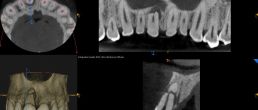Restoring your smile with healthy teeth
What are restorative treatments?
This is how we restore individual teeth back to health and complete your smile. We may recommend a few options and will help guide you to the most suitable for your individual situation.


Why choose Green Room Dentistry for Restorative Treatments?
We have an abundance of experience in providing long lasting, natural looking restorative dentistry for our patients.
As a rule we aim to select the most durable treatment for each tooth. If there are constraints on time, general health, age or budget then we will work with you to achieve a satisfactory result.
Many patients have been with us for decades and we look after 4 generations in some cases! It is also flattering how far many will travel to see us.
Select from our restorative treatments:

White Fillings
Here at Green Room Dentistry we do not use mercury containing, silver amalgam fillings to fill teeth. Instead we restore teeth with a white filling material called composite. This material bonds strongly to the tooth and has proved to be highly durable. We match the colour and shape carefully so only you should know that the tooth has been restored.
Find out more

Crowns
A crown is the most reliable and predictable way of restoring strength to a weak tooth by encasing the remaining tooth structure in ceramic or gold. The new crown will look, feel and function just like any of your natural teeth. Ceramic crowns may also be the best way to improve the look of your teeth if they are heavily filled, worn or misaligned.
Find out more
50+
Years Experience
WOW! Dental Awards Winner
Posted on
5 Star Google Reviews
GDC Registered
White Fillings
Fillings to seamlessly match your smile. Here at Green Room Dentistry we do not use mercury containing, silver amalgam fillings to fill teeth. Instead we restore teeth with a white filling material called composite. This material bonds strongly to the tooth and has proved to be highly durable. We match the colour and shape carefully so only you should know that the tooth has been restored.
What are white fillings?
A white filling is a non-metallic, tooth-coloured composite material used to restore decayed, broken or worn teeth. It is adapted to the tooth, hardens and is ready to eat with as soon as any numbness wears off.
How much do white fillings cost?
from £195
Replacing silver fillings with white fillings
We are extremely careful when replacing mercury containing fillings. We routinely use a technique called ‘rubber dam’ to protect you from mercury vapour. It comprises a thin square sheet used to isolate the operative site from the rest of the mouth. This is also the most comfortable way for you to have dentistry and allows us to achieve consistent results.
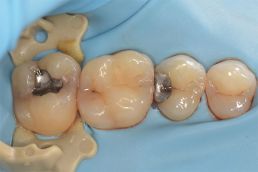
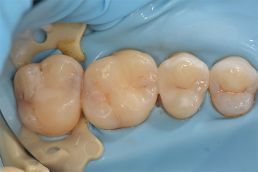
Example of before and after white fillings
Your questions answered about White Fillings
Inherent risks exist in all dental procedures, but the main concern with white fillings is their durability if correct technique is not followed. The tooth must be prepared meticulously and kept dry, the adhesive steps should be followed to the letter and the white filling allowed sufficient time to cure.
However, we have been successfully placing white fillings, day in, day out, for many years and have refined our techniques. New technology, material science and dental procedures are resulting in stronger, longer-lasting restorations.
The benefits far outweigh such problems, because a white filling:
- Can restore not only cavities caused by decay, but chipped, broken and worn teeth.
- Colour can be harmonised to your normal tooth colour to appear natural, so it isn’t noticeable when you smile.
- May be used as a veneer over stained or discoloured teeth.
- Does not contain mercury. It is not considered toxic or a danger to health.
- Adheres to the remaining tooth making it less likely to crack.
- Is completed in a single visit.
The fillings are made from a composite material of organic resin and glass/ceramic nano-particles. For large cavities we often fill the majority of the area with a flowable material which chemically hardens in just over a minute. If we need to sculpt the material to match the natural contours of your tooth we use a firmer composite. This can be carefully shaped then hardens when exposed to a specific blue lightwave curing light. We have a full palate of colours and opacities allowing us to achieve lifelike results.
It can vary, anywhere from 20 minutes all the way up to one hour per tooth. Your dentist will advise you of the length of appointment needed to correctly restore your tooth.
Normally we fit a dental dam, a fantastic device to isolate your teeth from the rest of your mouth. This keeps your tongue, lips and cheeks safely out of the way and gives us a clean dry area in which to operate. After removing plaque, tartar, decay and existing filling, the tooth is cleaned and then dried. To achieve a bond to the tooth, the surface is etched, primed and coated with an adhesive resin. Once prepared, the white filling material is placed into the tooth cavity or area to be filled, and then shaped to fit the tooth contours. A curing light is then used to harden the filling before it is trimmed and polished to look like a natural part of your tooth.
We don’t use amalgam fillings at all. That’s because we’re convinced that traditional silver amalgam fillings, which contain mercury have no place in the modern dental practice.
Amalgam fillings weaken the teeth, leading to fractures within the tooth structure. In time, they are also prone to corrode and leak, staining the filling and give the tooth an unsightly grey appearance.
From a health point of view, one of the principle components of amalgam is a mercury, a toxic metal. Overexposure to mercury can have debilitating effects on humans, and is commonly regarded as a poison.
These are just some of the reasons why we moved to amalgam-free treatment nearly 20 years ago. Since then all our patients have benefitted from dentistry that is not only healthy, but leaves their teeth looking good and feeling good for a very long time.
White fillings in Cornwall from Green Room Dentistry
The majority of our days are spent using this remarkable material to restore decayed, chipped or worn teeth back to full function. Our patients trust that this is not a rarely used service used on special occasions but the backbone of what we do. The nuances, strengths and limitations of the materials and applications are well known to us.
Crowns and Onlays
Crowns are great for restoring the strength and appearance of damaged teeth. Our careful planning, preparation and material choice for crowns gives a really natural looking attractive smile.
We work very closely with our Dental Laboratory partners from planning, colour and shape analysis, through to final finishing touches to ensure superb results, virtually indistinguishable from beautiful, healthy teeth.
Often new patients tell us they don’t want to smile and avoid being photographed because their old crowns look un-natural. Our expertise in carefully replacing these crowns greatly restores people’s appearance and self-confidence.
What are white crowns?
A crown is the most reliable and predictable way of restoring strength to a weak tooth by encasing the remaining tooth structure in ceramic or gold. The new crown will look, feel and function just like any of your natural teeth. Ceramic crowns may also be the best way to improve the look of your teeth if they are heavily filled, worn or misaligned.
How much do crowns cost?
£1050 for back teeth, £1500 for single front teeth and £1500 gold crowns.
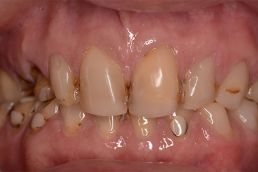
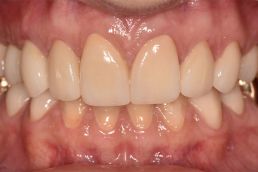
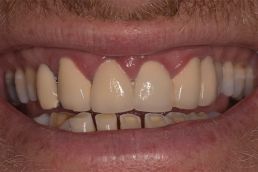
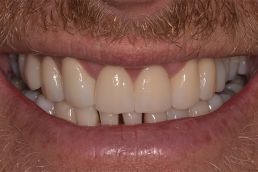
Examples of before and after crowns
Your questions answered about Crowns and Onlays
Crowns last, on average 10 to 15 years with gold being the most durable. It is not uncommon to see gold crowns lasting over 40 years! It must be understood that the crown will only last if the underlying tooth is healthy. If you have a high sugar diet, do not brush thoroughly or do not use a fluoride containing toothpaste then the underlying tooth will still decay.
The most tried and tested material is a gold alloy of 60% to 80% gold. We use gold a lot on back teeth where they do not show.
Where lifelike results are needed we use ceramic crowns made of zirconia or lithium disilicate. These are highly aesthetic and bio-compatible.
Crowns cover the entire tooth right down to the gum-line. This gives the best look as the join between the crown and tooth is hidden. Even if the gum recedes a little with time this join is often barely noticeable.
Onlays are frequently used on back teeth. The join is kept as far from the gum line as possible to preserve healthy tooth structure and maintain the tooth strength and vitality. The join may be visible on close inspection but this does not detract from the overall smile as we are selective where we use this technique.
To fit a crown the outer layer of tooth, about 1mm thick, must be removed to allow sufficient space for the crown. We usually reserve this technique when all other options have been explored. This is because if the tooth decays or cracks within the crown then we may not be able to save the tooth.
Generally, it takes two appointments, two weeks apart.
During the first visit, the tooth is shaped to allow room for the thickness of the crown. A scan impression is taken of your teeth using a digital intra-oral scanner. This takes multiple photographs to record your teeth and bite in fine detail. This is a very precise process, which ensures an exact fit. Gone are the days when molds are taken with a putty setting in your mouth. A temporary crown is fabricated for you to see you through until your next appointment. The crown is custom-made by a lab technician according to the dentists’ instructions. We often take photographs, with colour reference tabs and polarising filters, to assist the technician in getting a good match.
At the second appointment, the temporary crown is removed and the tooth is thoroughly cleaned. A few minor adjustments may be required to custom-fit the crown exactly to your bite. Your new crown is then cemented onto your tooth and is ready to use straight away.
Veneers just cover the front surface of the tooth and are used more for cosmetic improvement than strengthening compromised teeth.
Crowns in Cornwall from Green Room Dentistry
At Green Room Dentistry we use crowns a great deal to strengthen weakened teeth, particularly those with root fillings. We also replace crowns placed decades ago which no longer match the natural teeth or just detract from someone’s overall appearance.
Our digital mouth scanners have also done away with the need for the traditional moulds which are unpleasant at best.
Bridges and Dentures
If you are missing teeth there are a few ways of replacing them:
Dentures are removable false teeth Bridges are permanent replacement teeth supported by a natural tooth or teeth Dental implants are the closest thing to natural teeth that modern dentistry has to offer - we have a dedicated section for this contemporary treatment
What are bridges and dentures?
Dentures are removable false teeth made from materials like acrylic, nylon and a metal called cobalt chromium. They can be used to replace a single tooth right up to a full set. They are the most economical way to replace teeth but also the least well tolerated.
Bridges give you fixed replacement teeth which are not removable. They are secured with either a ‘wing’ which bonds to the inner surface of the support tooth, or a crown which encases the supporting tooth or teeth.
The ‘wing’ type is known as an adhesive bridge. They are suitable for missing front teeth and only require removal of a thin layer, typically 1mm, of enamel from the inner surface of the support tooth.
The ‘crown’ type, known as a conventional bridge, involves the entire outer surface of the support tooth, or teeth, so the bridge can be cemented in place. These can be used for larger gaps.
How much does it cost to replace teeth?
Dentures start at £795, single tooth bridges £2000 and dental implants £3250
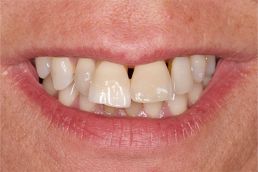
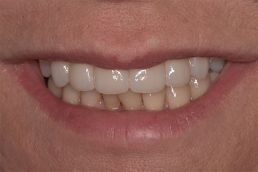
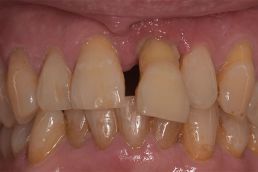
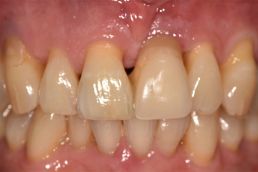
Examples of before and after bridges
Your questions answered about Bridges and Dentures
Bridges can be made from gold alloy, porcelain fuse to metal or zirconia.
Gold is great for back teeth and highly durable.
Porcelain fused to metal combines the inherent strength of metal with the natural beauty of porcelain, making it ideal for larger bridges.
Zirconia is metal free, highly bio-compatible and extraordinarily lifelike.
At this present time, no one material is ideal for all bridges so we choose the best fit for each individual situation.
Dentures are often made from acrylic into which composite denture teeth are set. Acrylic is pink and can be tinted to closely resemble natural gum. If you are missing teeth and the jaw has shrunk then acrylic can replace the lost tissue in a remarkably lifelike way. It is also a repairable material and can have more teeth added should you lose further natural teeth.
If you prefer the roof of your mouth to not be completely covered with a ‘plate’ we use a framework of Cobalt Chromium, a silver coloured alloy, in conjunction with acrylic. This is far stronger than acrylic so can be much thinner and leave the majority of your palate uncovered.
A third type of denture uses nylon for the base. This is flexible so can click into place by hugging the adjacent teeth. These work well in the short term and we often use them immediately following tooth loss before placing implants. The downsides are that nylon is soft so scratches and stains easily.
Bridges last 10 to 15 years on average and can last much longer if cared for.
It must be understood that the bridge will only last if the underlying tooth is healthy. If you have a high sugar diet, do not brush thoroughly or do not use a fluoride containing toothpaste then the underlying tooth will still decay.
Nylon dentures, as mentioned above, are a short-term fix to maintain your appearance whilst a more permanent treatment is carried out.
Acrylic dentures and those with a cobalt chromium framework can last 10 years or more. Just like people wear down their natural teeth at greatly differing rates, the same is true of dentures. We have patients with 30 year old dentures and those who wear down or break them within 5 years!
Many people tolerate upper dentures well and they can look remarkably lifelike so only you know they are not your natural teeth. Speech can be tricky to begin with but returns to normal within a few days in most cases.
Lower dentures are not well tolerated on the whole as they tend to move, rub and do not allow the same bite forces for eating as natural teeth. Using denture fixative under the lower denture can help. Our preferred option is to stabilise them with dental implants
Dentures can affect taste if they cover the roof of your mouth and can cause gagging.
If you wear a partial denture then more plaque will accumulate on your natural teeth. This renders them more susceptible to tooth decay and gum disease.
For replacing small front teeth adhesive bridges are often the best choice. Little to no preparation of the support tooth is needed and they can last for years. In many cases they can be re-stuck if they de-bond from the tooth.
Conventional bridges can span larger gaps and may be a good option if you are un-suitable for implants. The drawbacks are the preparation required to the support teeth. This removal of the outer layer makes the support teeth more prone to decay and damage to the tooth nerve.
Why choose Green Room Dentistry for Dentures and Bridges?
At the Green room we are able to offer you all options for tooth replacement and will help guide you towards the right treatment.
Ultimately we want to provide replacement teeth which are efficient to eat with, comfortable, look great and will last. Age, young or old, general health and the overall condition of your teeth can all play a part in selecting what will work best
Emergency Dental Care
Pain, swelling or a broken tooth? Dental emergency care is required to stabilise any serious problem with the teeth, mouth and associated areas to relieve pain and prevent further damage. Rest assured that patients registered with our practice are seen as soon as possible, usually within a day.
What is classed as a Dental Emergency?
Dental emergencies may range from mild to severe and include:
- Broken teeth or tooth loss
- Infected wisdom teeth
- Ulceration and persistent bleeding
- Abscesses
- Swelling anywhere in the mouth or face
- Difficulty opening the mouth
- Toothache
How much does emergency dental care cost?
£235 for unregistered and £150 for registered patients to include the problem investigation, x-rays, prescription if needed and temporary treatment.
Go to A&E if you have toothache and:
- The area around your eye or your neck is swollen
- Swelling in your mouth or neck is making it difficult for you to breathe, swallow or speak
Call us if you have toothache:
- That lasts more than 2 days
- That does not go away when you take painkillers
- With a high temperature, pain when you bite, red gums, or a bad taste in your mouth
- and your cheek or jaw is swollen
Do not to go to your GP as they will not be able to give you dental treatment.
A few other useful tips:
- If there is a cavity in the tooth, a temporary filling material can be packed in to this space – these can be bought from pharmacies or supermarkets
- Desensitising toothpaste such as Colgate sensitive pro relief or Sensodyne rapid relief can help – they can also be applied directly to a sensitive tooth
- Keep your head elevated at night time with an extra pillow as reducing blood flow to the tooth may relieve the pain
- Keep the area of the face around the tooth cool by applying an icepack (a bag of frozen peas works well) to the outside of the cheek
- Clean between the teeth with floss or an interdental brush – you can also put chlorhexidine gel like Curasept onto the interdental brush to help clean the area
- Rinsing thoroughly with a chlorhexidine gluconate mouthwash like Curasept, can help.
Your questions answered about Emergency Dental Care
DO
- Take painkillers, like ibuprofen or paracetamol Please follow the recommended dose and check that you can take them alongside any other medications you take or conditions you suffer with – a pharmacist can advise you
- Try rinsing your mouth with salt water – dissolve half a teaspoon of salt in a glass of warm water – rinse your mouth with the solution then spit it out – do not swallow it – repeat as often as you like (children should not try this)
- Use a pain-relieving gel for your mouth – this can be bought from pharmacies or supermarkets
- Eat soft foods, like yoghurt or scrambled eggs, and try to avoid chewing with the sore tooth
DON’T
- Do not eat foods that are sweet, very hot or very cold
- Do not smoke – it can make some dental problems worse
Depending on the severity of the problem this will vary. For registered patients with urgent emergencies we aim to see you on the same day.
Leaving a tooth or gum problem untreated may not only lead to a dental emergency but can affect your overall health, particularly if you have other medical conditions, such as diabetes or cardiac problems.
- have regular dental health reviews
- seek treatment early for any dental concerns
- wearing mouth guards during contact sports
- cut down on sugary foods and drinks – only have them as an occasional treat at mealtimes
- brush your teeth twice a day for about 2 minutes with a fluoride toothpaste
- clean between your teeth using floss or an interdental brush every day to remove food, debris and plaque
Emergency dental care in Cornwall from Green Room Dentistry
Our registered patients are prioritised to be seen promptly in an emergency – usually the same day. We zone our diary to allow space for these events so you don’t suffer unnecessarily.
If you are not registered with us, and we have space, we will get you in. We have found these patients usually then sign up with us as they like how we treat them.
Many of our patients also have Denplan supplementary insurance allowing them access to emergency care when over 40 miles from the practice (if they can’t get to us) or abroad. They simply contact Denplan, who have a huge database of registered dentists, and they arrange it all for you.
Root Canal Treatment
We do everything we can to save teeth at Green Room Dentistry. Root canal treatment is the process of removing infection, and often the damaged nerve, deep inside the root of a tooth. On the whole it is a painless treatment to save teeth that would otherwise have to be taken out, allowing you to keep your own teeth for a lifetime.
What is Root Canal Treatment ?
Root canal treatment is the only means of saving a tooth in which the nerve and blood supply has been irreversibly damaged. This can happen because serious tooth decay, injury or developmental imperfections.
Inside each tooth is a tube that runs from the end of the root to a chamber inside the crown. This is the root canal and inside the canal is the tooth’s blood and nerve supply, known as the ‘pulp’. Teeth usually have between one and four roots with up to five separate root canals.
How much does root canal treatment cost?
£675 to £1035 per tooth.
Root Canal Treatment Step-by-Step
- After numbing the tooth a small hole is made through the top or back of the tooth to access the root canals
- Single use precision files are used to uniformly shape the canals down to the root tips
- The canals are thoroughly washed out with sodium hypochlorite and other agents to remove any infected tissue
- We then seal the canals with a natural rubber called Gutta Percha and a biocompatible cement called Calcium Hydroxide
- The access hole is filled – with back teeth we recommend a crown for the tooth to prevent cracking and maximise lifespan
Your questions answered about Root Canal Treatment
Bacteria can get into the pulp from dental decay or directly from the mouth if a filling is lost. Once bacteria are established, the nerve becomes painfully inflamed and eventually dies. This results in an abscess.
The other way the pulp dies is if the tooth is knocked and displaced with an external blow. This severs the delicate blood and nerve supply which enters the tooth at the root tip. This is common with front teeth and if left untreated the tooth appears grey as the dying pulp leaches into the porous tooth structure.
When this happens the only way to save the tooth is to remove the infection and dying nerve – a procedure called root canal treatment. Unfortunately, antibiotics alone cannot permanently treat the infection and the only other cure, besides root canal treatment, is tooth removal.
It is very uncommon to experience pain during the treatment. Occasionally, with a tooth that has been agonisingly painful, we may need to employ a few extra measures to fully numb the tooth so any discomfort will be minimised.
Root canal treatment is usually successful at saving teeth and clearing infection.
90% of root-treated teeth survive for 8 to 10 years.
Having a crown fitted to a chewing (back/side) tooth after root canal treatment is important for improving survival rates.
The survival of your tooth depends on a number of factors:
- how much of the natural tooth remains
- how well you keep your teeth clean
- the biting forces on the tooth
If an infection does return, the root canal treatment can be usually be repeated. Or if treatment has already been carried out to a high standard and the infection remains, a small operation to remove the root tip (an apicoectomy) may be carried out to treat the infection. We occasionally recommend referring you to a Specialist Endodontist if your problem is particularly complex.
Root Canal Treatment in Cornwall from Green Room Dentistry
We love teeth and do everything possible to save them. Sometimes this involves root canal treatment. Richard’s interest started at Dental School where he was awarded the American Association of Endodontist’s Prize. Sally completed a Diploma in Post-Graduate Dental Studies choosing Endodontics as one of her modules. We have all the technology to make this treatment painless, efficient and predictable.
Anything else we can help you with?
Arrange a consultation and together we’ll find what’s right for you and your dental health.
What our lovely clients say...
"I came to this practise after the recommendation of my sister. I'm so glad she sent me here! I had a lot of work to be done and now I have a nice set of teeth in good health. Despite the busy schedule they had, they managed to provide me with quick and friendly service. The advice given during my treatments were very helpful and made me feel super comfortable as you could tell they have a lot of care for their work. Thank you so much to my dentist Sally and the whole team."
Treatment: White Fillings
"Richard is a brilliant dentist and his staff are all amazing. I had a crown fitted last week - it was a painless experience - the guy is so skilled that even though I’m a nervous patient I barely felt the injection let alone the rest of the procedures. Can’t recommend these guys enough."
Treatment: Crowns
"The staff at the Green Room were absolutely amazing today. I’d been awake all night in agony. I called at 8.45am and was given an appointment for 9.20am! The care I received was amazing. Constantly being reassured and encouraged throughout the extraction of my wisdom tooth. The whole process was completely pain free. A big thank you to all the staff. I’m in the area on holiday so not a regular patient."
Treatment: Emergency Care
"I recently had treatment done by Richard and his team and am super happy with the work they’ve done. He is an amazing dentist who seems to really know his stuff and is up to date with technology, and talks you through everything - making sure you know all options and understand what he’s doing. He has a really calming manner and makes you feel really at ease the whole time."
Treatment: White Fillings
"This dentist was highly recommended by a friend and my experience too has been excellent. I would have no hesitation recommending Richard. He has done a miraculous job rebuilding my teeth and I am really grateful to him for doing it with so much patience and empathy."
Treatment: Crowns
"As an unregistered patient The Green Room practice was willing to see me after an injury left me with dental pain. They were caring and called to check I was OK... My appointment proved to be very thorough and time was taken to put me at ease. I will be registering with the practice as soon as they have a vacancy."
Treatment: Emergency Care
"Richard and staff have restored my faith in dentists. After nasty abscess resulting in hosp admission and surgery, I have a new bridge and confidence. Thank you from bottom of my heart."
Treatment: Bridge
"My elderly Mum needed an emergency appointment for a sudden infection, she was seen at 11:00 on the day I called the Green Room, as always, she was treated with the utmost care and consideration for her well-being. The Green Room is fantastic, our whole family are so pleased that we are able to go and be treated by Sally and Richard and their lovely team. Thank you all."
Treatment: Emergency Care
"Fantastic Practice, Amazing staff, every visit was a pleasure and so nice to be made to feel so at ease. First class treatment in a top class surgery, could not have been any better...thank you so much!!"
Treatment: Crowns
"Brilliant service!! I managed to break a crown and despite being busy, they managed to squeeze me in at very short notice and quickly and professionally they waved their “magic drill” and sorted out my train wreck of a tooth!! Thank you so much. Top class team. I thoroughly recommend Green Room Dentistry."
Treatment: Emergency Care
"All staff very professional, caring and knowledgeable. Sally quickly identified the issue relating to my tooth pain and prescribed antibiotics to relieve the discomfort. To ensure that the underlying problem could be addressed quickly, she reorganised her schedule to fit in a lengthy root canal treatment. The day after the treatment I received a follow-up telephone call asking how I felt. Great dentists using the latest equipment and techniques."
Treatment: Emergency Care

